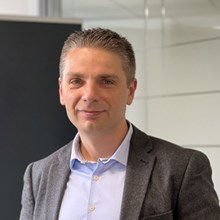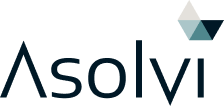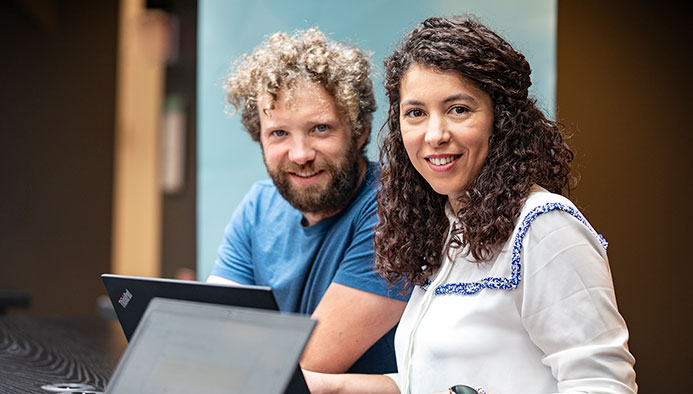
Alex joined Asolvi when the company acquired perform IT and added mySalesDrive.com — a software platform that helps create a smarter sales process for the office equipment and IT industry — to its solutions portfolio. He’s been with Asolvi for over a year now. In that time, Alex has noticed the positive impact of the company’s culture on him and his team — and the way that mySalesDrive.com is now being developed.
“An acquisition is a strange thing,” he recollects. “You feel like you’re entering a new company, but at the same time, you’re still at the old one. It takes you out of your comfort zone but in a good way. It opens up the possibilities of new challenges and exciting career directions — and I always try to promote this idea to my team.”
I’m a line manager too, and I can tell you that if you’re motivated, your team is as well. It’s infectious!
In the intervening months, Alex has stepped away from some of the other responsibilities that he had at perform IT. These included ownership for internal IT administration, delivering front-line customer support, conducting software training, and managing the customer support team. This allowed him to focus more on product engineering and development. Around the same time, he also got a new line manager who championed this career shift: “That’s when I felt like I’d joined the company properly,” Alex remembers.
“His enthusiasm was amazing. I’m a line manager too, and I can tell you that if you’re motivated, then your team is as well. It’s infectious! And the results speak for themselves — over the last ten months, we’ve worked hard and delivered many product innovations and proposed a range of improvements by discovering and sharing new technological ideas.”
A long-term software strategy and a culture that encourages innovation
Alex notes that getting more control over software development has increased his motivation and his team’s. It’s allowed them to challenge themselves with new aspects of product engineering — making full use of their combined skills and taking a more structured, long-term view on how the product evolves.
Becoming part of Asolvi and embracing the company’s culture gave us the confidence to implement a long-term product development plan.
“Before Asolvi acquired perform IT, if the sales team asked for a piece of product development, we often had to drop what we were doing and prioritise their request,” he recalls. “Becoming part of Asolvi and embracing the company’s culture gave us the confidence to implement a long-term product development plan. We can factor in scheduled engineering enhancements and also leave time for feature requests from the sales team. It means we have far more control and can work in a less disruptive, more logical, and more effective way.”
Alex recalls that, after joining Asolvi, his team initially invested a few months to refactoring and automated testing — giving them a much more robust platform to build new functionality. Then they started developing a software usage analytics module: “It’s something that we’ve never done before but had always wanted to do at a very product-specific level of detail. It’s exciting to work this way, and the team and I are really motivated right now,” he tells us.
Asolvi’s allowed-to-fail and no-blame culture is so important — it’s a culture with plenty of freedom and a spirit of discovery.
Alex thinks this way of working has allowed him and his team to push the boundaries of software engineering. “We all understand that working at the fringes of what’s possible means sometimes an idea won’t be successful and won’t make it into customer-facing trials.”
“That’s why Asolvi’s allowed-to-fail and no-blame culture is so important — it’s a culture with plenty of freedom and a spirit of discovery. We know failures are treated as a learning experience to help inform future decisions and ensure the same mistakes aren’t repeated.”
A flexible approach to working
Since becoming part of Asolvi, Alex’s team has also had more freedom to work outside of the traditional nine-to-five structure — and get their jobs done during the most convenient hours for them, whether that’s in the office or working remotely. Of course, they have some core hours when everyone needs to be working, but outside of that, some prefer to work evenings while others like to finish their tasks early in the morning.
“There’s a lot of trust — there has to be — because we’ve moved to a hybrid way of working,” Alex comments. “There’s no longer any clocking on and off. What matters most is the output. If staff are motivated and not micro-managed, then they tend to have much better output. But it depends on trust. You’ve got to be able to trust each other.”
Finding time to relax
Looking back on the last ten months, Alex recollects that one of the most memorable moments was when his team met up for the first time after COVID restrictions were lifted.
Even though it is nice and comfortable to work from home, people still need to recharge their social energy from time to time.
“We got together, ran a workshop, and then went for dinner. After such a busy few months — and after the isolation of having to work from home all the time — it was great for us all to finally relax a bit and get to know each other better. We’d missed the usual things that colleagues get to do — like office drinks or Christmas dinner — and we were just focused on work. Even though it is nice and comfortable to work from home, people still need to recharge their social energy from time to time. That’s why these social events are so important to build the team’s identity, have proper interaction and share some common ground that’s not just about work.”
Alex has had some interaction with engineering teams from other parts of the business, including TIVAPP and MyMobileWorkers, but it’s been limited so far. It’s something that he expects will change as each part of the business becomes more settled under the Asolvi umbrella. But he notes there’s no point in cross-business meetings unless they serve a purpose and are planned properly — and it’s rare for them to happen right now: “When there are more joint engineering projects, then this will happen naturally, and it’s something we’re working on now for the future.”
Alex concludes: “I’d encourage people to consider Asolvi for their next job. It’s a great place to work, and the people are genuinely nice and friendly. You’ll have a lot of freedom to try things out, experiment and innovate — and you’ll have time to invest in learning and development, which is hugely important.”



